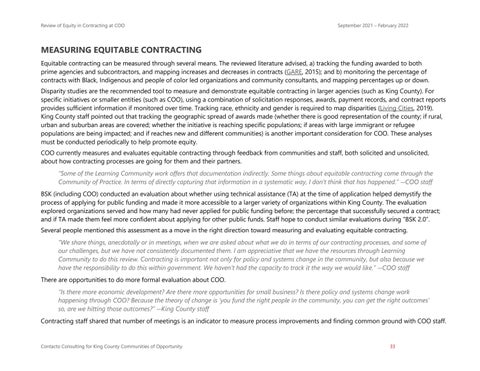Review of Equity in Contracting at COO
September 2021 – February 2022
MEASURING EQUITABLE CONTRACTING Equitable contracting can be measured through several means. The reviewed literature advised, a) tracking the funding awarded to both prime agencies and subcontractors, and mapping increases and decreases in contracts (GARE, 2015); and b) monitoring the percentage of contracts with Black, Indigenous and people of color led organizations and community consultants, and mapping percentages up or down.
Disparity studies are the recommended tool to measure and demonstrate equitable contracting in larger agencies (such as King County). For specific initiatives or smaller entities (such as COO), using a combination of solicitation responses, awards, payment records, and contract reports provides sufficient information if monitored over time. Tracking race, ethnicity and gender is required to map disparities (Living Cities, 2019). King County staff pointed out that tracking the geographic spread of awards made (whether there is good representation of the county; if rural, urban and suburban areas are covered; whether the initiative is reaching specific populations; if areas with large immigrant or refugee populations are being impacted; and if reaches new and different communities) is another important consideration for COO. These analyses must be conducted periodically to help promote equity. COO currently measures and evaluates equitable contracting through feedback from communities and staff, both solicited and unsolicited, about how contracting processes are going for them and their partners. “Some of the Learning Community work offers that documentation indirectly. Some things about equitable contracting come through the Community of Practice. In terms of directly capturing that information in a systematic way, I don’t think that has happened.” ―COO staff BSK (including COO) conducted an evaluation about whether using technical assistance (TA) at the time of application helped demystify the process of applying for public funding and made it more accessible to a larger variety of organizations within King County. The evaluation explored organizations served and how many had never applied for public funding before; the percentage that successfully secured a contract; and if TA made them feel more confident about applying for other public funds. Staff hope to conduct similar evaluations during “BSK 2.0”. Several people mentioned this assessment as a move in the right direction toward measuring and evaluating equitable contracting. “We share things, anecdotally or in meetings, when we are asked about what we do in terms of our contracting processes, and some of our challenges, but we have not consistently documented them. I am appreciative that we have the resources through Learning Community to do this review. Contracting is important not only for policy and systems change in the community, but also because we have the responsibility to do this within government. We haven’t had the capacity to track it the way we would like.” ―COO staff There are opportunities to do more formal evaluation about COO. “Is there more economic development? Are there more opportunities for small business? Is there policy and systems change work happening through COO? Because the theory of change is ‘you fund the right people in the community, you can get the right outcomes’ so, are we hitting those outcomes?” ―King County staff Contracting staff shared that number of meetings is an indicator to measure process improvements and finding common ground with COO staff.
Contacto Consulting for King County Communities of Opportunity
33



